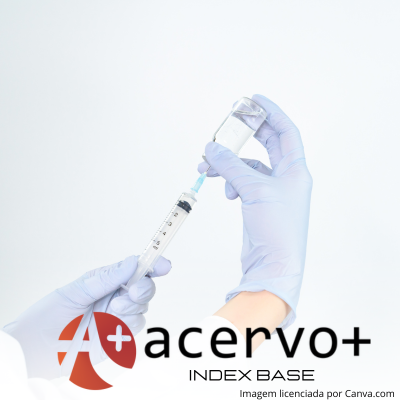Imunoterapia para melanoma: terapias combinadas
##plugins.themes.bootstrap3.article.main##
Resumo
Objetivo: Avaliar a eficácia e a sobrevida de pacientes com melanoma através de terapias imunoterápicas combinadas. Métodos: Trata-se de uma revisão de literatura integrativa e utilizou-se como pergunta norteadora: Existe algum protocolo de imunoterapia combinado mais eficaz e com maior taxa de sobrevida para o tratamento de pacientes com melanoma? O levantamento bibliográfico ocorreu nas seguintes bases de dados: US National Library of Medicine (PubMed) e Biblioteca Virtual em Saúde (BVS). Os artigos foram transferidos e analisados na plataforma Rayyan para identificação e quantificação de duplicidades, observando os critérios de inclusão. Resultados: Melhores taxas de sobrevida global, sobrevida livre de progressão e de respostas com os novos protocolos terapêuticos na imunoterapia, ainda que a toxicidade e efeitos adversos associados sejam os principais motivos para a descontinuação do tratamento. Considerações finais: O uso de novos protocolos terapêuticos com os inibidores de checkpoint consiste em uma abordagem promissora, mostrando-se eficaz e aprimorando a sobrevida para grupos específicos de pacientes com melanoma. Todavia, mais estudos são necessários para alcançar um melhor parâmetro de risco-benefício.
##plugins.themes.bootstrap3.article.details##
Copyright © | Todos os direitos reservados.
A revista detém os direitos autorais exclusivos de publicação deste artigo nos termos da lei 9610/98.
Reprodução parcial
É livre o uso de partes do texto, figuras e questionário do artigo, sendo obrigatória a citação dos autores e revista.
Reprodução total
É expressamente proibida, devendo ser autorizada pela revista.
Referências
2. ASCIERTO PA, et al. Sequencing of Ipilimumab Plus Nivolumab and Encorafenib Plus Binimetinib for Untreated BRAF-Mutated Metastic Melanoma (SECOMBIT): A Randomized, Three-Arm, Open-Label Phase II Trial. Journal of Clinical Oncology, 2021; 41(2): 212-221.
3. COEN O, et al. The DANTE trial protocol: a randomised phase III trial to evaluate the Duration of ANti-PD-1 monoclonal antibody Treatment in patients with metastatic mElanoma. BMC Cancer, 2021; 21(761): 1-10.
4. DA SILVA IP, et al. Site-Specific Response Patterns, Pseudoprogression, and Acquired Resistance in Patients With Melanoma Treated With Ipilimumab Combined With Anti–PD-1 Therapy. Cancer, 2020; 126(1): 86-97.
5. DIAB A, et al. Bempegaldesleukin Plus Nivolumab in Untreated Advanced Melanoma: The Open-Label, Phase III PIVOT IO 001. Journal of Clinical Oncology, 2023; 41(30): 4756-4767.
6. EGGERMONT AMM, et al. PIVOT-12: a Phase III study of adjuvant bempegaldesleukin plus nivolumab in resected stage III/IV melanoma at high risk for recurrence. Future Oncology, 2022; 18(8): 903-913.
7. FERRUCCI PF, et al. KEYNOTE-022 part 3: a randomized, double-blind, phase 2 study of pembrolizumabe, dabrafenib, and trametinib in BRAF-mutant melanoma. Journal for ImmunoTherapy of Cancer, 2020; 8(2): 1-9.
8. GROSSMAN KF, et al. Adjuvant pembrolizumab versus IFNα2b or Ipilimumab in Resected High-Risk Melanoma. American Association for Cancer Research Journals, 2022; 12(3): 644-653.
9. HAMID O, et al. Long-term outcomes in patients with advanced melanoma who had initial stable disease with pembrolizumab in KEYNOTE-001 and KEYNOTE-006. European Journal of Cancer, 2021; 157: 391-402.
10. HASANOV M, et al. An Open–Label, Randomized, Multi–Center Study Comparing the Sequence of High Dose Aldesleukin (Interleukin–2) and Ipilimumab (Yervoy) in Patients with Metastatic Melanoma. OncoImmunology, 2021; 10(1): 1-10.
11. HUSSEIN AT, et al. Relatlimab and Nivolumab versus Nivolumab in Untreated Advanced Melanoma. The NEW ENGLAND JOURNAL of MEDICINE, 2022; 386(1): 24-34.
12. KHATTAK MA, et al. Adjuvant pembrolizumab versus placebo in resected high-risk stage II melanoma: Health-related quality of life from the randomized phase 3 KEYNOTE-716 study. European Journal of Cancer, 2022; 176(112957): 207-217.
13. LARKIN J, et al. Adjuvant nivolumab versus ipilimumab (CheckMate 238 trial): Reassessment of 4-year efficacy outcomes in patients with stage III melanoma per AJCC-8 staging criteria. European Journal of Cancer, 2022; 173: 285-296.
14. LARKIN J, et al. Five-Year Survival with Combined Nivolumab and Ipilimumab in Advanced Melanoma. The NEW ENGLAND JOURNAL of MEDICINE, 2019; 381(16): 1535-1546.
15. LODDE GC, et al. Adjuvant treatment and outcome of stage III melanoma patients: Results of a multicenter real-world German Dermatologic Cooperative Oncology Group (DeCOG) study. European Journal of Cancer, 2023; 191(112957): 1-10.
16. LONG GV, et al. Overall Survival and Response with Nivolumab and Relatlimab in Advanced Melanoma. NEJM Evidence, 2023; 2(4): 1-10.
17. LUKE JJ, et al. pembrolizumab versus placebo as adjuvant therapy in completely resected stage IIB or IIC melanoma (KEYNOTE-716): a randomised, double-blind, phase 3 trial. The Lancet, 2022; 399(10336): 1718-1729.
18. OLSON DJ, et al. Pembrolizumab Plus Ipilimumab Following Anti-PD-1/L1 Failure in Melanoma. Journal of Clinical Oncology, 2021; 39(24): 2467- 2655.
19. SCHADENDORF D, et al. Safety and efficacy of nivolumab in challenging subgroups with advanced melanoma who progressed on or after ipilimumab treatment: A single-arm, open-label, phase II study (CheckMate 172). European Journal of Cancer, 2019; 121: 144-153.
20. WOLCHOK JD, et al. Long-Term Outcomes With Nivolumab Plus Ipilimumab or Nivolumab Alone Versus Ipilimumab in Patients With Advanced Melanoma. Journal of Clinical Oncology, 2024; 40(2): 127-137.

